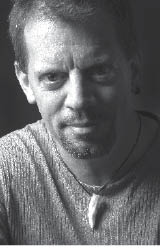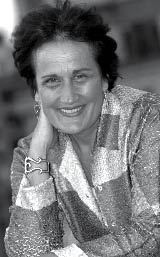June in Buffalo 2007
by Jan Jezioro

Music for Voices/Music for Quartets” is the title of this year’s June in Buffalo festival, which takes place June 4-10 on UB’s Amherst Campus. Founded in 1975 by the legendary composer Morton Feldman, the event provides an opportunity for aspiring composers to meet with established, well known composers for a very full week of seminars, master classes, lectures and public concerts. This year’s senior composers are John Harbison, Steve Reich, Roger Reynolds, Charles Wuorinen and David Felder, the festival’s artistic director. They’ll be joined by 20 advanced students from Europe, Asia, South America and the USA (selected from almost one hundred applicants) who will each get the rare opportunity to hear one of their works performed by world class musicians in a professional setting. David Felder, now in his 22nd year as artistic director, continues to defy the odds in what promises to be one of the most exciting events in the series.
Here is a sample of some of the highlights of this year’s festival:
Noted minimalist composer Steve Reich returns on Monday for “An Evening with Steve Reich” at the Center for the Arts Drama Theater. The program by the Slee Sinfonietta includes Tehillim, a 1981 work based on a setting of Hebrew Psalms featuring four female singers, and Daniel Variations, a work that premiered in London last October.
Reich’s Daniel Variations was written to honor Daniel Pearl, the Wall Street Journal reporter whose brutal murder by Islamist extremists in 2002 in Pakistan was videotaped and widely broadcast. The text of the work incorporates Pearl’s own words with selections from the biblical Book of Daniel. Judea Pearl, Daniel’s father, approached Reich about the possibility of writing a piece of music to commemorate both the life and death of his son. As Reich noted in an interview in The Guardian, “I said to him, ‘I think you are carrying my text.’ And of course he was. God sent him to give me my text.”
“When the piece first begins, you might think, ‘Can this really be Steve Reich?’ It’s much darker, not at all what I’m known for,” he says. “Since Pearl was a fiddle player, I said, ‘Let’s have a full string quartet. Let’s add a second violin and viola.’ And at that point, when his text comes in, the strings just take off.” Reich uses Pearl’s final words, “My name is Daniel Pearl. I’m a Jewish American from Encino, California,” spoken just before his beheading, to loop and coil around his music, focusing not on the horror of that moment but on the luminosity of the name Daniel Pearl.
The biblical text that Reich uses is Daniel 4:2: I saw a dream. Images upon my bed and visions in my head frightened me.
Reich feels that this text speaks strongly—not only to the fate of Daniel Pearl but to the world of post 911 terrorism. “We are living in a time when such horrific dreams are a reality.”
On Tuesday evening Harold Rosenbaum leads the New York Virtuoso Singers in a program of works based on sacred texts. Founded by Rosenbaum in 1988, the ensemble has become the country’s leading advocate of contemporary choral music. The pieces are performed a cappella, with the exception of But Mary Stood, a 2005 work by Pulitzer Prize-winning composer John Harbison. The piece starts with a prelude for strings alone and is followed by two motets. The final movement, Harbison notes, “proposes the soloist as both narrator and Mary; the double choir as Jesus. These three characters each have their own vocabulary, family related. The setting envisions a Mary Magdalene who was the true intimate of Jesus, who understood intellectually and intuitively his purpose on earth.”
The only work listed on the program that is not based in some way on a sacred text is the intriguingly titled “A piece of coffee” by Patrick Castillo.
Wednesday evening, the “Music for Quartets” portion of the festival takes center stage, with a performance by the Arditti String Quartet. Actually, the Arditti gets a jump on things on Tuesday, performing the afternoon program at Baird Recital Hall. They continue their remarkable tour de force by also performing the Thursday afternoon concert (again at Baird). Performing a total of 10 different quartets, many of them premieres, the Arditti Quartet may well be the hardest working group at this year’s festival, a fact that should come as no surprise.

Founded by first violinist Irwin Arditti in 1974, the group has had several hundred works written for it and their discography includes over one hundred recordings. The quartet has premiered works by dozens of the most famous living composers and is known for its highly spirited, technically refined interpretations of contemporary music. The evening program includes a work premiered by the Arditti in 1994, Pulitzer Prize winner Roger Reynolds’ Ariadne’s Thread, for string quartet and computer-generated sound.
Also on the program is the world premiere of David Felder’s String Quartet No. 2 Stekt-Stucke, commissioned by the Siemens Foundation. The work consists of 17 brief movements, each 30 to 90 seconds in length. The shortness of the movements may be viewed as Felder’s commentary on the disturbing trend in modern American culture of compressing and distorting the terms of serious cultural and political discourse into the framework of the sound bite.
Thursday evening and Friday afternoon belong to the red fish blue fish percussion ensemble, a California-based group that functions as a laboratory for the development of new percussion techniques and music. Director Steve Schick’s collection of instruments ranges from flower pots, gourds, wood blocks and all kinds of drums to something called “Sixxen,” a xylophone-like instrument created by Greek composer Iannis Xenakis. Roger Reynolds’ 2004 piece Sanctuary, for percussion quartet, real-time computer-processed and spatialized sound and lighting design, should be a highlight of the evening, along with Wuorinen’s Percussion Quartet, a work that treats the ensemble as a collection of duos and quartets.
The program on Saturday evening of solo vocal music is especially intriguing. When the Paris-based bass/baritone Nicholas Isherwood was a UB visiting faculty member a few years back, he gave a memorable performance of Equatorial, by Edgar Varese. The text of Equatorial derives from the Popul-Vuh, the sacred book of the ancient Maya, and Varese specified that the reading be “dramatic and incantatory.” Isherwood delivered a performance that literally made the hairs stand up on the back of the neck.
Isherwood’s talents should be ideally suited to the performance of The Palace by Roger Reynolds, based on a poem by the great Argentinean writer Jorge Luis Borges. The vocalist, alternating between his normal, dramatic baritone voice and a high countertenor, sings in accompaniment to his own pre-recorded, mannered, spoken-word reading of the poem. The piece has a certain spiritual kinship to Equatorial in that it also tends to blur the boundaries between music and ritual, developing a sense of urgency that has been described as often unsettling if not downright spooky.
Isherwood will also be the soloist in David Felder’s Chasmal for bass voice, electronics and video. Felder describes hearing the work as being “an immersive experience for the listener.” One of the ways that the Hebrew word “chasmal” might be translated is as “speaking silence.” The work draws its inspiration from the tradition of Jewish meditation as developed from a reading of the Book of Ezekiel. Besides the sounds of natural elements such as water or wind, all the sound elements in the piece are derived from the voice of the soloist, representing the struggle of man to connect with the divine.
Violinist Curtis Macomber is the soloist in the unaccompanied Songs of Solitude by Harbison, an exquisitely delicate meditation on the differing kinds of solitude inherent in all musical experience, as experienced by composer, player and listener.
Soprano Lucy Shelton will sing Fenton Songs II, by the uncompromisingly modernist composer and Pulitzer Prize winner Charles Wuorinen. Based on four poems by the contemporary British poet James Fenton, the lush beauty of the 2002 work—especially as sung by Shelton—has managed to win more than a few converts among those listeners leery of Wuorinen’s generally austere idiom.
For the final event on Sunday afternoon the Buffalo Philharmonic Orchestra makes a welcome return to June in Buffalo, for the first time since 1996. Resident Conductor Robert Franz will lead the orchestra in a program that includes two works by John Harbison. Darkbloom is an overture for an opera based on Vladimir Nabokov’s Lolita—an opera that the composer ultimately decided not to write. Seductively swaying rhythms depicting a tennis game are playfully developed in a not totally innocent manner before the musical equivalent of high simmering laughter provides what Harbison describes as a “frail epiphany.” In Partita Harbison merges, or as he describes it “collides,” two separate Baroque musical forms in each of the four movements. For example, in the first movement the seeds of a contrary sounding Fantasia are embedded in the formal structure of the initial Praeludium, with resulting tensions. “These encounters seem to me to make their ancient impulses very contemporary,” according to the composer.
David Felder’s big Three Pieces for Orchestra was premiered by the BPO at Kleinhans back in 1996, while Felder was the orchestra’s composer-in-residence, and subsequently replayed at that year’s June in Buffalo. For this performance Felder is substituting his 1994 piece Linebacker Music for the original third movement. Linebacker Music, as the name might suggest, is a forceful, high-energy piece that has proven to be very effective on repeated hearings, and it’s a good bet here that it will make an already strong work even stronger.
|
Issue Navigation> Issue Index > v6n22: Bet You Can't Stop At One! (5/31/07) > Music > June in Buffalo 2007 This Week's Issue • Artvoice Daily • Artvoice TV • Events Calendar • Classifieds |









 Current Issue
Current Issue